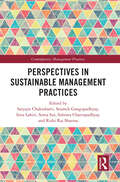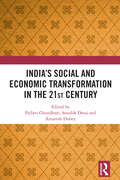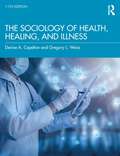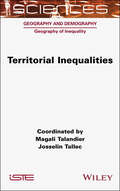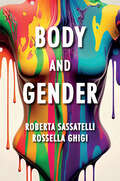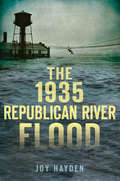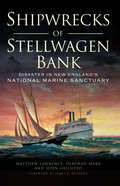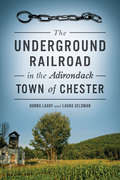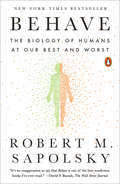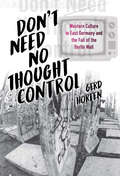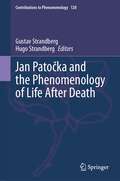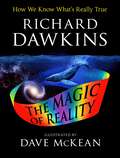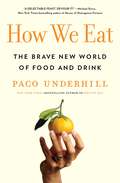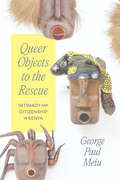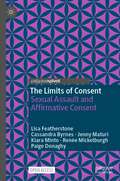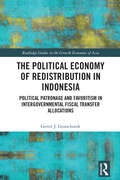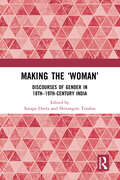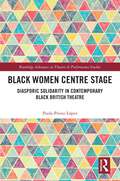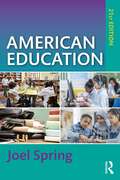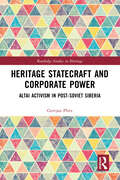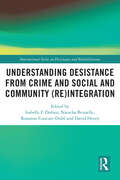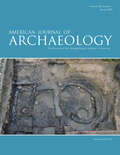- Table View
- List View
Cambridge Studies on the African Diaspora: How Objects Of Prestige Shaped The Atlantic Slave Trade And Colonialism (Cambridge Studies On The African Diaspora Ser.)
by Ana Lucia AraujoPerspectives in Sustainable Management Practices (Contemporary Management Practices)
by Satyajit Chakrabarti, Soumik Gangopadhyay, Isita Lahiri, Soma Sur, Subrata Chattopadhyay and Rishi Raj SharmaEmbracing sustainable management practices is important for businesses and commercial organizations wishing to responsibly contribute to the socioeconomic development of societies and communities. This book provides insights into recent trends, issues, and challenges in embracing these practices, while promoting growth and innovation in business. The COVID-19 pandemic has redefined the necessity of implementing sustainable practices. This book looks at the process, implementation, and evaluation of sustainable practices in the social and commercial sectors in recent years. With case studies from different industries, these chapters explore and document creative applications of effective measures to chart out financial growth for businesses while reducing carbon emissions, focusing on corporate social responsibility, and working toward socio-economic sustainability for workers and communities, among others. They also examine how these innovative strategies can be scaled up and applied across diverse industries, for small and large businesses, and in different economic environments. Part of the Contemporary Management Practices series, this book will be useful to practising managers, researchers, and students who are interested in business strategy, financial strategy, and social inclusion. It will be especially of use to those working in the areas of corporate governance, corporate social responsibility, green marketing, corporate finance, and organizational performance.
India’s Social and Economic Transformation in the 21st Century
by Pallavi Choudhuri Sonalde Desai Amaresh DubeyThis book provides a comprehensive analysis of India’s social and economic transformation in the decades leading up to the COVID-19 pandemic and explores both resilience and vulnerabilities in Indian society. It provides an in-depth look into diverse aspects of how Indians live, earn a living and care for their children by examining vital indicators such as poverty, malnutrition, health and marriage and family relationships, among others. Analysing the data from the India Human Development Surveys, it presents a complex picture of India’s transformation and large economic and educational gains, while exploring the reasons why these have not translated into social transformation of a similar magnitude. The volume also describes the backdrop against which the COVID-19 pandemic crippled the Indian economy. In effect, it foreshadows the challenges that need to be addressed on the road to recovery. It argues that in order to reduce the scarring and ensure recovery for all, it will be important to focus on the underlying conditions faced by the most vulnerable sections of the Indian society as policymakers seek to effectively tend to issues of socio-economic inequality and marginalisation in the long run. Rich in data and analysis, this book will be useful for scholars and researchers of economics, political economy, sociology and development studies.
World Prehistory: A Brief Introduction
by Brian M. Fagan Nadia DurraniThis is an introduction to human prehistory written for complete beginners with a global perspective. It is written in a jargon-free style that covers 6 million years of the remote past from human origins to the first pre-industrial civilizations, balancing theoretical discussion with descriptions and analysis of major sites and cultural developments. World Prehistory provides a unique and balanced narrative of what happened in the prehistoric past and why. The book is well worth acquiring, as it provides essential historical background to a wide variety of subjects, from written history and environmental studies to climate change. Chronological tables, numerous illustrations, guides to further reading, and stand-alone boxes on some archaeological methods, key sites, and some people of the past amplify much of the basic narrative. This global prehistory is aimed at people with no background in archaeology, undergraduates at all levels, and participants in graduate seminars on a wide range of subjects. Numerous people with a general interest in archaeology and multidisciplinary history have acquired and enjoyed this book.
The Sociology of Health, Healing, and Illness
by Gregory L. Weiss Denise CopeltonWith thorough coverage of inequality in health care access and practice, this leading textbook is widely acclaimed by instructors as the most comprehensive of any available. Written in an engaging and accessible style, with multiple student-friendly features, it integrates recent research in medical sociology and public health to introduce students to a wide range of issues affecting health, healing, and health care today. This new edition links information on COVID-19 into each chapter, providing students with a solid understanding of the social history of medicine; social epidemiology; social stress; health and illness behavior; the profession of medicine; nurses and allied health workers; complementary and alternative medicine; the physician-patient relationship; medical ethics; and the financing and organization of medical care. Important changes and enhancements in the eleventh edition include: Inclusion of material on COVID-19 in the main text of every chapter, with special sections at the end of each chapter exploring additional intersections of COVID-19 with chapter content. Expanded coverage of fundamental cause theory and the social determinants of health. New centralized discussions of how and why social disparities in race, class, gender, and sexual identity impact health outcomes in the United States. New “In the Field” boxed inserts on topics such as medical education and student debt, physicians’ use of medical jargon, and corporate greed. New “In Comparative Focus” boxed inserts on topics such as the 1918 influenza pandemic, infant and maternal mortality in Afghanistan, the patient care coordination process, drug prices, long-term care, and global health. A more in-depth look at both physician and nursing shortages. Expanded discussion of nurse burnout during the COVID-19 pandemic. Curricular and pedagogical changes in medical schools. Discussion of continued changes in the financing of the US health care system. A more in-depth look at quality concerns in nursing homes. Increased attention to the health care systems in Norway, Germany, Cuba, and Mexico. An updated instructor’s guide with test bank and PowerPoint slides.
Survey Development: A Theory-Driven Mixed-Method Approach
by Tony Chiu Lam Kathy Ellen GreenSurvey Development: A Theory-Driven Mixed-Method Approach provides both an overview of standard methods and tools for developing and validating surveys and a conceptual basis for survey development that advocates establishing and testing of hypotheses pertaining to presumptions and score-interpretation and use inferences and mixing quantitative and qualitative methods. The book has 14 chapters which are divided into four parts. Part A includes six chapters that deal with theory and methodology. Part B has five chapters and it gets into the process of constructing the survey using both quantitative and qualitative methods. Part C comprises two chapters devoted to assessing the quality or psychometric properties (reliability and validity) of survey responses. Finally, the one chapter in Part D is an attempt to present a synopsis of what was covered in the previous chapters in regard to developing a survey with the TDMM framework for developing survey and conducting survey research. This provides a full process for survey development intended to yield results that can support valid interpretation and use of scores. Including detailed online resources, this book is suitable for graduate students who use or are responsible for interpretation of survey research and survey data as well as survey methodologists and practitioners who use surveys in their field.
Territorial Inequalities
by Magali Talandier Josselin TallecSpatial planning has embraced the idea of dealing with territorial inequalities by focusing on equipment logic on a national scale, and then economic development on a local scale. Today, this issue is creating new angles of debate with strong political resonances (e.g. Brexit, French gilets jaunes movement). Interpretations of these movements are often quick and binary, such as: the contrast between metropolises and peripheries, between cities and the countryside, between the north and the south or between the east and the west of the European Union. Territorial Inequalities sheds light on the social, political and operational implications of these divergences. The chapters cover the subject at different scales of action and observation (from the neighborhood to the world), but also according to their interdependences. To deal with such a vast and ambitious theme, the preferred approach is that of territorial development in terms of public policy, namely spatial planning.
Body and Gender: Sociological Perspectives
by Roberta Sassatelli Rossella GhigiEven though we often think of bodies as natural and given, or else as freely plastic objects, bodies are both constructed and fundamental to our sense of self. This book investigates the body as an essential vector of inequality, shaped by institutions, interaction and culture, and how in turn it contributes to partly modify them. Sassatelli and Ghigi show how the process of embodiment is at the same time naturalized and contested, particularly evident in the case of gender. Drawing on classical sociological research about modernity and contemporary studies that emphasize intersectionality, the book looks at how the gendered body has been conceptualized with special attention to body politics, the power of appearance and the representation of embodied identity. It also considers the interplay between body, sex and sexuality and the way gendered bodies intersect with other dimensions of social inequality such as race, age, class and disability. This exploration of the rich field of sociological inquiry into the gendered body will be an invaluable read for all seeking to understand gender, sexuality and embodiment in contemporary society.
The 1935 Republican River Flood (Disaster)
by Joy HaydenOn May 31, 1935, a storm system surged along the Republican River, bursting its banks in a matter of minutes with a roar that could be heard miles away. The greatest flood to hit the tri-state area of Colorado, Kansas and Nebraska, it left behind a landscape rearranged beyond recognition and claimed more than one hundred casualties. However, amid all the destruction and sorrow, amazing acts of heroism and unwavering courage were reported throughout the valley. Author Joy Hayden reveals the historic disaster and the steadfast resolve of those who witnessed it.
Shipwrecks of Stellwagen Bank: Disaster in New England's National Marine Sanctuary (Disaster)
by Matthew Lawrence Deborah Marx John GalluzzoBeneath the churning surface of Stellwagen Bank National Marine Sanctuary rest the bones of shipwrecks and sailors alike. Massachusetts' ports connected its citizens to the world, and the number of merchant and fishing vessels grew alongside the nation's development. Hundreds of ships sank on the trade routes and fishing grounds between Cape Cod and Cape Ann. Their stories are waiting to be uncovered--from the ill-fated steamship Portland to collided schooners Frank A. Palmer and Louise B. Crary and the burned dragger Joffre. Join historian John Galluzzo and maritime archaeologists Matthew Lawrence and Deborah Marx as they dive in to investigate the sunken vessels and captivating history of New England's only national marine sanctuary.
The Underground Railroad in the Adirondack Town of Chester
by Donna Lagoy Laura SeldmanThe Town of Chester in upstate Warren County, New York, was a secret haven for runaway slaves escaping to Canada along the Underground Railroad. The small Adirondack town holds as many as nine confirmed or suspected sites where fugitives once found shelter. Stories abound of residents discovering secret rooms containing beds and other artifacts within their homes. The first abolitionist pastor of the Darrowsville Wesleyan Church, Reverend Thomas Baker, reportedly hid fugitive slaves in the parsonage. Color photographs and interviews with current residents illuminate the region's hidden history with the Underground Railroad movement. With the support of the Historical Society of the Town of Chester, Donna Lagoy and Laura Seldman reveal these courageous stories of local families who risked everything in the pursuit of freedom for all.
Behave: The Biology of Humans at Our Best and Worst
by Robert M. SapolskyWhy do we do the things we do?Over a decade in the making, this game-changing book is Robert Sapolsky's genre-shattering attempt to answer that question as fully as perhaps only he could, looking at it from every angle. Sapolsky's storytelling concept is delightful but it also has a powerful intrinsic logic: he starts by looking at the factors that bear on a person's reaction in the precise moment a behavior occurs, and then hops back in time from there, in stages, ultimately ending up at the deep history of our species and its genetic inheritance.And so the first category of explanation is the neurobiological one. What goes on in a person's brain a second before the behavior happens? Then he pulls out to a slightly larger field of vision, a little earlier in time: What sight, sound, or smell triggers the nervous system to produce that behavior? And then, what hormones act hours to days earlier to change how responsive that individual is to the stimuli which trigger the nervous system? By now, he has increased our field of vision so that we are thinking about neurobiology and the sensory world of our environment and endocrinology in trying to explain what happened.Sapolsky keeps going--next to what features of the environment affected that person's brain, and then back to the childhood of the individual, and then to their genetic makeup. Finally, he expands the view to encompass factors larger than that one individual. How culture has shaped that individual's group, what ecological factors helped shape that culture, and on and on, back to evolutionary factors thousands and even millions of years old.The result is one of the most dazzling tours de horizon of the science of human behavior ever attempted, a majestic synthesis that harvests cutting-edge research across a range of disciplines to provide a subtle and nuanced perspective on why we ultimately do the things we do...for good and for ill. Sapolsky builds on this understanding to wrestle with some of our deepest and thorniest questions relating to tribalism and xenophobia, hierarchy and competition, morality and free will, and war and peace. Wise, humane, often very funny, Behave is a towering achievement, powerfully humanizing, and downright heroic in its own right.
Don't Need No Thought Control: Western Culture in East Germany and the Fall of the Berlin Wall
by Gerd HortenThe fall of the Berlin Wall is typically understood as the culmination of political-economic trends that fatally weakened the East German state. Meanwhile, comparatively little attention has been paid to the cultural dimension of these dramatic events, particularly the role played by Western mass media and consumer culture. With a focus on the 1970s and 1980s, Don’t Need No Thought Control explores the dynamic interplay of popular unrest, intensifying economic crises, and cultural policies under Erich Honecker. It shows how the widespread influence of (and public demands for) Western cultural products forced GDR leaders into a series of grudging accommodations that undermined state power to a hitherto underappreciated extent.
Jan Patočka and the Phenomenology of Life After Death (Contributions to Phenomenology #128)
by Gustav Strandberg Hugo StrandbergThis volume contains for the first time in English, Jan Patočka’s seminal essay “The Phenomenology of Afterlife”, as well as contributions surrounding and analyzing this text. In his essay, Patočka reflects on our relation to the dead and on how the departure of a loved one affects our continued existence. The premise of Patočka’s investigation is that our existence always takes place by and through an originary and reciprocal “being for others”.The contributors in the volume extend the field of inquiry into the wider phenomenological and post-phenomenological discussion of death by being cognizant of how works of literature can broaden our understanding of the care of death, grief, forgiveness and non-reciprocal love. Also included are reflections on issues of philosophical anthropology, community, collective memory, and the ecstatic nature of life – issues that can all be related back to Patočka’s initial reflections, but which nonetheless radiate into a myriad of directions. This volume appeals to students and researchers in the field.
The Magic of Reality: How We Know What's Really True
by Richard DawkinsMagic takes many forms. Supernatural magic is what our ancestors used in order to explain the world before they developed the scientific method. The ancient Egyptians explained the night by suggesting the goddess Nut swallowed the sun. The Vikings believed a rainbow was the gods’ bridge to earth. The Japanese used to explain earthquakes by conjuring a gigantic catfish that carried the world on its back—earthquakes occurred each time it flipped its tail. These are magical, extraordinary tales. But there is another kind of magic, and it lies in the exhilaration of discovering the real answers to these questions. It is the magic of reality—science. Packed with clever thought experiments, dazzling illustrations and jaw-dropping facts, The Magic of Reality explains a stunningly wide range of natural phenomena. What is stuff made of? How old is the universe? Why do the continents look like disconnected pieces of a puzzle? What causes tsunamis? Why are there so many kinds of plants and animals? Who was the first man, or woman? This is a page-turning, graphic detective story that not only mines all the sciences for its clues but primes the reader to think like a scientist as well. Richard Dawkins, the world’s most famous evolutionary biologist and one of science education’s most passionate advocates, has spent his career elucidating the wonders of science for adult readers. But now, in a dramatic departure, he has teamed up with acclaimed artist Dave McKean and used his unrivaled explanatory powers to share the magic of science with readers of all ages. This is a treasure trove for anyone who has ever wondered how the world works. Dawkins and McKean have created an illustrated guide to the secrets of our world—and the universe beyond—that will entertain and inform for years to come.
How We Eat: The Brave New World of Food and Drink
by Paco UnderhillAn &“eye-opening&” (Kirkus Reviews) and timely exploration of how our food—from where it&’s grown to how we buy it—is in the midst of a transformation, showing how this is our chance to do better, for us, for our children, and for our planet, from a global expert on consumer behavior and bestselling author of Why We Buy.Our food system is undergoing a total transformation that impacts how we produce, get, and consume our food. Market researcher and bestselling author Paco Underhill—hailed by the San Francisco Chronicle as &“a Sherlock Holmes for retailers&”—reveals where our eating and drinking lives are heading in his &“delectable&” (Michael Gross, New York Times bestselling author of 740 Park) book, How We Eat. In this upbeat, hopeful, and witty approach, How We Eat reveals the future of food in surprising ways. Go to the heart of New York City where a popular farmer&’s market signifies how the city is getting country-fied, or to cool Brooklyn neighborhoods with rooftop farms. Explore the dreaded supermarket parking lot as the hub of innovation for grocery stores&’ futures, where they can grow their own food and host community events. Learn how marijuana farmers, who have been using artificial light to grow a crop for years, have developed a playbook so mainstream merchants like Walmart and farmers across the world can grow food in an uncertain future. Paco Underhill is the expert behind the most prominent brands, consumer habits, and market trends and the author of multiple highly acclaimed books, including Why We Buy. In How We Eat, he shows how food intersects with every major battle we face today, from political and environmental to economic and racial, and invites you to the market to discover more.
Queer Objects to the Rescue: Intimacy and Citizenship in Kenya
by George Paul MeiuExamines forms of intimate citizenship that have emerged in relation to growing anti-homosexual violence in Kenya. Campaigns calling on police and citizens to purge their countries of homosexuality have taken hold across the world. But the “homosexual threat” they claim to be addressing is not always easy to identify. To make that threat visible, leaders, media, and civil society groups have deployed certain objects as signifiers of queerness. In Kenya, for example, bead necklaces, plastics, and even diapers have come to represent the danger posed by homosexual behavior to an essentially “virile” construction of national masculinity. In Queer Objects tothe Rescue, George Paul Meiu explores objects that have played an important and surprising role in both state-led and popular attempts to rid Kenya of various imagined threats to intimate life. Meiu shows that their use in the political imaginary has been crucial to representing the homosexual body as a societal threat and as a target of outrage, violence, and exclusion, while also crystallizing anxieties over wider political and economic instability. To effectively understand and critique homophobia, Meiu suggests, we must take these objects seriously and recognize them as potential sources for new forms of citizenship, intimacy, resistance, and belonging.
The Limits of Consent: Sexual Assault and Affirmative Consent (Palgrave Socio-Legal Studies)
by Lisa Featherstone Cassandra Byrnes Jenny Maturi Kiara Minto Renée Mickelburgh Paige DonaghyThis open access book examines the ways that consent operates in contemporary culture, suggesting it is a useful starting point to respectful relationships. This work, however, seeks to delve deeper, into the more complicated aspects of sexual consent. It examines the ways meaningful consent is difficult, if not impossible, in relationships that involve intimate partner violence or family violence. It considers the way vulnerable communities need access to information on consent. It highlights the difficulties of consent and reproductive rights, including the use (and abuse) of contraception and abortion. Finally, it considers the ways that young women are reshaping narratives of sexual assault and consent, as active agents both online and offline. Though this work considers victimisation, it also pays careful attention to the ways vulnerable groups take up their rights and understand and practice consent in meaningful ways.
The Political Economy of Redistribution in Indonesia: Political Patronage and Favoritism in Intergovernmental Fiscal Transfer Allocations (Routledge Studies in the Growth Economies of Asia #153)
by Gerrit J. GonschorekThis book analyses how different institutional intergovernmental transfer designs influence patronage and favoritism in public fund allocations in Indonesia. Presenting original research and investigating existing theories on the determinants of public fund allocations, the book uses Indonesia as a case study. Indonesia, often claimed to be characterized by money politics, provides an ideal setting for this analysis. The countries' decentralized fiscal system consists of various institutional intergovernmental transfer designs allocating public funds to a large variety of districts to finance public service provision. The author exploits those distinctive differences between various institutional intergovernmental transfer designs and investigates their influence on the prevalence of favoritism and patronage in public funds allocations while holding the political system, the observation period, and the government officials involved constant. A valuable contribution to the literature on the political economy of redistribution, this book will be of interest to academics working on economics and political science, particularly in public finance and development economics, but also in development studies or Southeast Asian studies.
Making the 'Woman': Discourses of Gender in 18th-19th century India
by Sutapa Dutta Shivangini TandonThe book examines the representation of women, their agency and subjectivity and gender relations in 18th- and 19th-century India. The chapters in the volume interrogate notions and discourses of ‘women’ and ‘gender’ during the period, historically shaped by multiple and even competing actors, practices and institutions. They highlight the ‘making of the woman’ across a wide spectrum of subject areas, regions and roles and attempt to understand the contradictions and differences in social experiences and identity formations of women. The volume also deals with prevalent notions of masculinity and femininity, normative and non-conformist expressions of gender and sexual identity and epistemological concerns of gender, especially in its intersectional interplay with other axes of caste, class, race, region and empire. Presenting unique understandings of our gendered pasts, this volume will be of great interest to scholars and researchers of history, gender studies and South Asian studies.
Black Women Centre Stage: Diasporic Solidarity in Contemporary Black British Theatre (Routledge Advances in Theatre & Performance Studies)
by Paola Prieto LópezThis book examines the political alliances that are built across the diaspora in contemporary plays written by Black women playwrights in the UK. Through the concept of creative diasporic solidarity, it offers an innovative theoretical approach to examine the ways in which the playwrights respond creatively to the violence and marginalisation of Black communities, especially Black women. This study demonstrates that theatre can act as a productive space for the ethical encounter with the Other (understood in terms of alterity, as someone different from the self) by examining the possibilities of these plays to activate the spectators’ responsibility and solidarity towards different types of violence experienced by Black women, offering alternative modes of relationality. The book engages with a range of contemporary works written by Black women playwrights in the UK, including Mojisola Adebayo, Theresa Ikoko, Diana Nneka Atuona, Gloria Williams, Charlene James, or Yusra Warsama, bringing to the fore a gendered and intersectional approach to the analysis of the texts. This book will be of great interest to students and scholars in contemporary theatre, gender studies and diaspora studies.
American Education (Sociocultural, Political, and Historical Studies in Education)
by Joel SpringFeaturing current information and challenging perspectives on the latest issues and forces shaping the American educational system—with scholarship that is often cited as a primary source—Joel Spring introduces readers to the historical, political, social and legal foundations of education and to the profession of teaching in the United States. In his signature straightforward, concise approach to describing complex issues, he illuminates events and topics that are often overlooked or whitewashed, giving students the opportunity to engage in critical thinking about education. Students come away informed on the latest topics, issues and data and with a strong knowledge of the forces shaping the American educational system. Updated throughout, the 21st edition of this clear, authoritative text remains fresh and up-to-date, reflecting the many changes in education that have occurred since the publication of the previous edition. New coverage includes: Discussion of “culture wars” and critical race theory Parental rights versus the goals of common education LGBTQIA+ students’ rights Discussion of the current administration’s educational policies
Heritage Statecraft and Corporate Power: Altai Activism in Post-Soviet Siberia
by Gertjan PletsHeritage Statecraft and Corporate Power examines the politicization of heritage and heritage conflicts in Siberia. In so doing, it challenges the idea that heritage is created by the state and instead argues that heritage creates the state. Building upon extensive ethnographic fieldwork undertaken in south-central Eurasia, this book provides an analysis of the sociopolitical enmeshment of archaeology and heritage in Russia’s resource colony: Siberia. Although many examples from across Siberia are discussed, the core study region for the book is the Altai Republic, which is located where Russia, Mongolia, Kazakhstan, and China intersect. Taking a “heritage statecraft” approach, Plets argues that heritage is a particularly important political instrument in this region. The book considers how different social “groups”—including indigenous communities, Russian settlers, displaced groups, national and international archaeologists, political parties, and energy companies—translate archaeological data into culturally distinct heritages. Plets encourages scrutiny of the different players that mobilize heritage to instill norms and ideas and the ways in which new regulations or institutions are ultimately implemented. Heritage Statecraft and Corporate Power contributes to key debates around the politics of archaeology, resource development, and cultural heritage. It will be essential reading for academics and students engaged in the study of heritage, archaeology, and memory.
Understanding Desistance from Crime and Social and Community (International Series on Desistance and Rehabilitation)
by Isabelle F. Dufour, Natacha Brunelle, Roxanne Couture-Dubé, and David HenryThis book gives voice to justice-involved Canadian youth and young adults by sharing their views on their journey towards desistance from crime and social and community (re)integration. Building on interviews with 140 justice-involved youth and young adults (aged 16 to 35), the book explores the challenges they faced while they were under the control of the justice system, the ways in which they navigated the obstacles they came up against, and the support they needed to overcome them. What and who they consider to be facilitators in their journeys is presented. The book also examines experiences of assisted desistance in different settings, such as incarceration, addiction services, and community supervision. What distinguishes this book is its focus on how justice-involved youth and young adults perceive their own experiences of desistance from crime and social and community (re)integration. An accessible and compelling read, Understanding Desistance from Crime and Social and Community (Re)Integration will be of interest to those engaged with desistance studies, rehabilitation, re-entry, juvenile and adult justice, and recovery from addiction.
American Journal of Archaeology, volume 128 number 1 (January 2024)
by American Journal of ArchaeologyThis is volume 128 issue 1 of American Journal of Archaeology. The American Journal of Archaeology, the journal of the Archaeological Institute of America, was founded in 1885 and is one of the world's most distinguished and widely distributed peer-reviewed archaeological journals. The AJA reaches more than 40 countries and approximately 700 universities, learned societies, departments of antiquities, and museums. The AJA publishes original research on the diverse peoples and material cultures of the Mediterranean and related areas, including North Africa (with Egypt and Sudan), Western Asia (with the Caucasus), and Europe, from prehistory through late antiquity.

